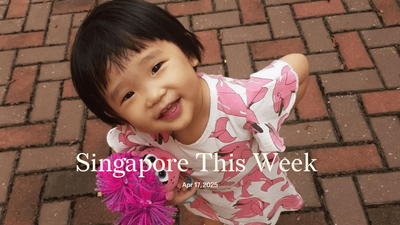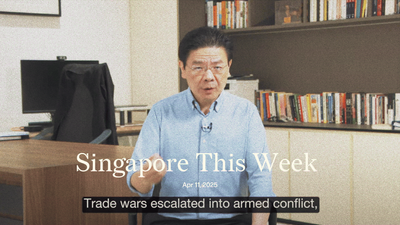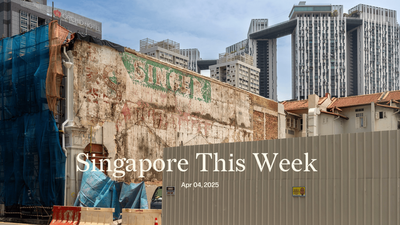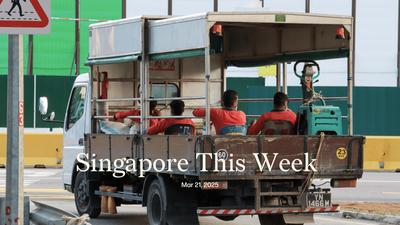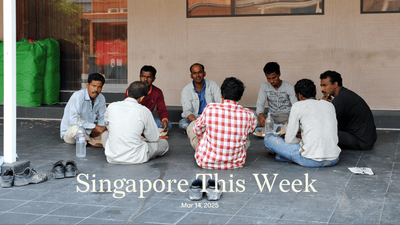Politics: A more boisterous Parliament
When observing proceedings in Singapore’s tame, rubber-stamp Parliament, political wonks have long wished for a bit more of the cut-and-thrust of the UK’s House, but not so much as Taiwan’s: punching, water ballooning and, in November 2020, even the throwing of pig organs over a plan to allow US meat imports (some called it an “offal fight”). Given that there are now more opposition members (11) in Singapore’s Parliament than at any point since the late 1960s, things have been heating up. “Speaker, if Minister [K Shanmugam] didn’t ask me, I suggest you don’t ask me,” snapped Leong Mun Wai of the Progress Singapore Party, at Tan Chuan-Jin, the speaker from the ruling People’s Action Party (PAP), who had asked Leong for a clarification on an allegation. (Merely the latest altercation between the two.) Indranee Rajah, second minister for finance and national development, and leader of the house, rose to admonish Leong: “...the tone in which we address one another is important.” Leong later apologised to Tan and amended the Facebook post that had irked Shanmugam, the law and home affairs minister. The mainstream media tore into Leong’s conduct. Unfortunately for Indranee, online sleuths noticed her flinging a red file in obvious anger before she (gently) addressed Leong. Good thing she wasn’t carrying raw meat.
Society: Is breast still best when freeze-dried?
Having difficulty storing your breast milk? Two Singaporean companies, Babyfeeds and LyoBB, now offer the option to freeze-dry breast milk through lyophilisation, a process which removes the milk’s water content after it's frozen. Mothers can simply add water to their own breast milk powder, as they do with formula milk. The companies claim that this retains the nutritional value of breast milk while allowing for the convenience of formula. But breastfeeding is not “just a transaction,” says Mythili Pandi, a doctor and lactation consultant. “There is love, care [and] connection…[Freeze-drying breast milk] perhaps diminishes the mother element from the process of breastfeeding.” However, there are real barriers to breastfeeding, especially for working mothers. In order to keep a steady supply of milk, mothers need to pump an average of 15 minutes every three to four hours. For those who work in spaces without a designated nursing room, some are forced to pump at their desk under a jacket–“It is quite awkward doing this, especially when we have many (male) contractors walking around…There is no privacy.” Even those who have access to a nursing room face the challenge of storage. Shared pantry fridges aren’t ideal. Breastfeeding, like many other aspects of motherhood, is often romanticised as a woman’s natural birthright and purpose. But the reality is that the mental, physical and emotional load borne by breastfeeding mothers is uniquely difficult, and it’s a task that can’t be shared with partners or nannies. Ideally, mothers in Singapore would have much longer paid maternity leave and workspaces that accommodate their needs. Given circumstances today, safe, convenient and healthy alternatives to breastfeeding are all the more important.
Society: Time to heed that drink label
A study has found that the new, mandatory Nutri-Grade (NG) labelling system for pre-packaged drinks is effective in nudging shoppers toward healthier options. Rolled out on December 30th last year, the colour-coded scheme requires manufacturers to grade beverages A to D, according to their sugar and saturated fat content, with A being the healthiest rating. Researchers at the Duke-NUS Medical School split 138 participants into two groups. They asked them to spend at least S$50, including on at least one drink, at NUSMart, an online experimental store. One group’s “shop” offered drinks with labels, the other’s without. Results showed that more shoppers chose drinks rated A or B if they had NG labels: “Compared to what was bought during the shopping experience without the NG labels, those bought with the NG labels had a reduced sugar content of 1.5 grams per serving,” said the study’s principal investigator. Nutrient labelling systems exist in many other countries to promote nutritional awareness. They’re less punitive than outright bans and sugar/sin taxes. And in Singapore’s case, they’re also aimed at reducing the high prevalence of diabetes. But researchers in this study said that since drinks account only for a small proportion of groceries, there were no significant differences in the overall amount of calories, saturated fat or other nutrients present in the purchases. The NG labelling’s efficacy might improve when it’s expanded to include freshly prepared drinks and into non-retail settings, by the end of the year. Before long every food and drink consumed in Singapore may be labelled. Presumably an A for NEWater.
Arts: Poetry is coming
SingPoWriMo, or Singapore Poetry Writing Month, is on again this April. It takes place on a dedicated Facebook group, where its 7,000 members and counting are challenged to write a poem a day. Moderators, who are usually published poets, take turns giving participants writing prompts like, “Write a poem based on something that you’ve heard in a Zoom call” or “Write a poem that can be read both forwards and backwards.” SingPoWriMo began in 2014 and has become an instrumental way for new poets to develop and network. The writing group S@BER began after the 2017 edition of SingPoWriMo and counts emerging writers like Max Pasakorn, Lune Loh, and Natalie Wang within its ranks. SingPoWriMo has also presented opportunities for publication, both in its own anthology series and in anthologies like Desmond Kon Zhicheng-Mingdé’s Asingbol: An Archeology of the Singaporean Poetic Form, which collected poems shared during the 2016 edition of SingPoWriMo where the asingbol, an original poetic form invented by Kon, was one of the daily prompts. More information about SingPoWriMo can be found on its website.
Internet culture: Code switching
TikTok’s CEO Chew Shou Zi is the internet’s main character of the week for his composure under pressure during US Congressional hearings about the app. The Singaporean had to endure inane questioning from lawmakers—in keeping with their Luddite-like grilling of other tech bosses—accusing him of being a Chinese spy and wondering if TikTok uses camera data to track users’ levels of pupil dilation. While local news outlets are milking the publicity from a high profile Singaporean, some foreign commenters online have added to erroneous speculations that Chew is a Chinese national merely posing as Singaporean. One tweet, which garnered over 1.6m views, posted a TikTok that Chew had made as a smoking gun: “He speaks a sort of American English with a Mandarin accent. Singaporeans don’t speak this type of English.” Cue a flurry of responses from both Singaporean and South-east Asians at large educating the poster on the magic of code switching, a practice very familiar to a region that claims many accents and Englishes. If the sceptic wants to catch that accent in its natural environment, all they have to do is stand outside Hwa Chong Institution (where Chew was educated).
History Weekly by Faris Joraimi
Singaporean revolutionary Chan Sun Wing died earlier this week, aged 90. Chan served as a member of the PAP in our first elected legislature as a self-governing state before joining Barisan Sosialis in 1961. He fled the island in 1963 (the same year as Operation Coldstore) to escape the political crackdown, and joined the communist resistance in Malaya. Unlike many leftists whom Lee Kuan Yew detained and imprisoned without trial, whose communist credentials were ambiguous at best, Chan apparently became a Malayan Communist Party (MCP) member in the late 1960s. The Malayan Emergency (1948-60), in which the MCP fought British forces, was declared over by the time Chan joined the fray, but skirmishes along the Thai border continued well until 1989, against an independent “Malaysia”. The creation of the Malaysian Federation was itself condemned by many socialists locally and across the world, who saw it as a plot by the British (in cahoots with the Malay aristocracy and Chinese and Indian conservatives) to form a pro-West bulwark against Red China and a leftwing-supported Sukarno. Chan was among the Malaysia Plan’s opponents, and the historian Hong Lysa noted how the book Men in White attributes this to him simply taking orders from his party boss, as if communists didn’t have real convictions or reasons to be against seemingly ill-conceived schemes. With communism illegal in Singapore, and identifying as a socialist increasingly making one open to suspicion in that highly tense political climate (unless you stayed loyal to the PAP), someone like Chan Sun Wing had very few options. Staying almost certainly meant detention: for a decade, perhaps, maybe more. Fleeing to fight in the jungles probably made more sense. Following the Hat Yai Peace Agreement of 1989, Chan Sun Wing and his comrades were allowed refuge in Thailand and Malaysia, but have never been allowed to return to Singapore. Here’s a poem he read out in Tan Pin Pin’s 2013 film “To Singapore With Love”:
Thoughts on Changing Citizenship
2006, 17th May:
I changed my citizenship!
Born and bred a Singaporean
Who would’ve thought I’d have left home
for half a century
And spent 12 years stateless in Thailand
despite being a nation builder
Today, I became an IC-carrying Thai Citizen
Reluctantly, yet gratefully
Reluctant, for it is not that I don’t love Singapore
Grateful, for the generosity of the Thais
My smallpox vaccination from the colonial times
is still on my left arm
Kreta Ayer, Cross Street
Ang Siang Hill, Tanjong Pagar
Pasir Panjang, Clifford Pier
Our youthful stomping grounds
How can we forget?
In Upper Cross Street
where the Japanese drop their first bomb
On both sides of Temple Street
lay bodies to be collected, along with their stench
The white flags raised, we surrendered
The Japanese dogs leave, the British monkeys return
The Union Jack rises once again
In the old Kallang Airport
thousands cry “Merdeka!”
Amidst the wind and rain
we surged from self-governance to Independence
All these things I have seen
the History that I witnessed
I still have so much to tell you
Singapore, oh Singapore
If only you knew
how much your present and your future
still preoccupy me everyday
Written on 25th May 2006
South Thailand, Hat Yai
Chan Sun Wing
Tech: Ant crawls into South-east Asia
Compared to Grab-Singtel’s Digibank and Sea’s MariBank, Ant Group has been relatively quiet about Anext Bank, its Singapore-based digibank. This could be a function of the challenges it faces back home in China. According to regulatory filings, Ant Group recently injected another S$250m into Anext, which it launched in June last year after successfully securing a digital wholesale bank licence from the Monetary Authority of Singapore. Unlike Digibank and Maribank, Anext cannot yet serve retail customers. Anext focuses on servicing businesses, both local and regional, with business account and business loan products. It has been an active few months for Ant Group with a recent investment in Proxtera, a Singapore-based B2B cross border financing and fulfilment company. It has also partnered with BillEase, a Filipino buy-now-pay-later player, to enable instalment options for global platforms. The digital banking space in Singapore is highly competitive, with numerous players such as Green Link Digital Bank and Standard Chartered and Fairprice Group’s Trust Bank also entering the scene. Given the competition that it faces and the customer segment limitations with its licences, it may be a long, slow crawl for Ant in South-east Asia. On the other hand, the Group has significantly more experience operating financial services in China and could get off the ground with best practices from hard-earned experiences back home.
Tech: All out of jobs, Indeed
The tech winter has seen numerous tech companies such as Meta, Google, GoTo and Grab layoff staff in Singapore in the last few months. Several firms have also frozen hiring amidst the recessionary environment. Unsurprisingly, it is a bad time for recruiters and HRTech companies like Indeed. The US-based job portal has laid off more than 200 people, or about 90 percent of its Singapore office, most of whom were in the engineering and product teams. This came after Indeed announced global layoffs impacting 2,200 staff. Tech companies are known for their well-stocked pantries and other forms of staff welfare. To commemorate his departure, one former Indeed employee cheerfully filmed his final pantry run which amassed 200,000 views and 1,600 shares over the last few days. Who knows, he might just find his next gig with his newfound virality on social media. Despite the numerous tech layoffs that have happened in recent months, the Manpower Ministry last December stated that vacancies in the sector still remained high, while retrenchments in other sectors remained low. But with one of the largest job portals laying off staff, other tech workers may also soon be grabbing all the chips and chocs they can find.
If you enjoy Jom’s work, do get a paid subscription today to support independent journalism in Singapore.


